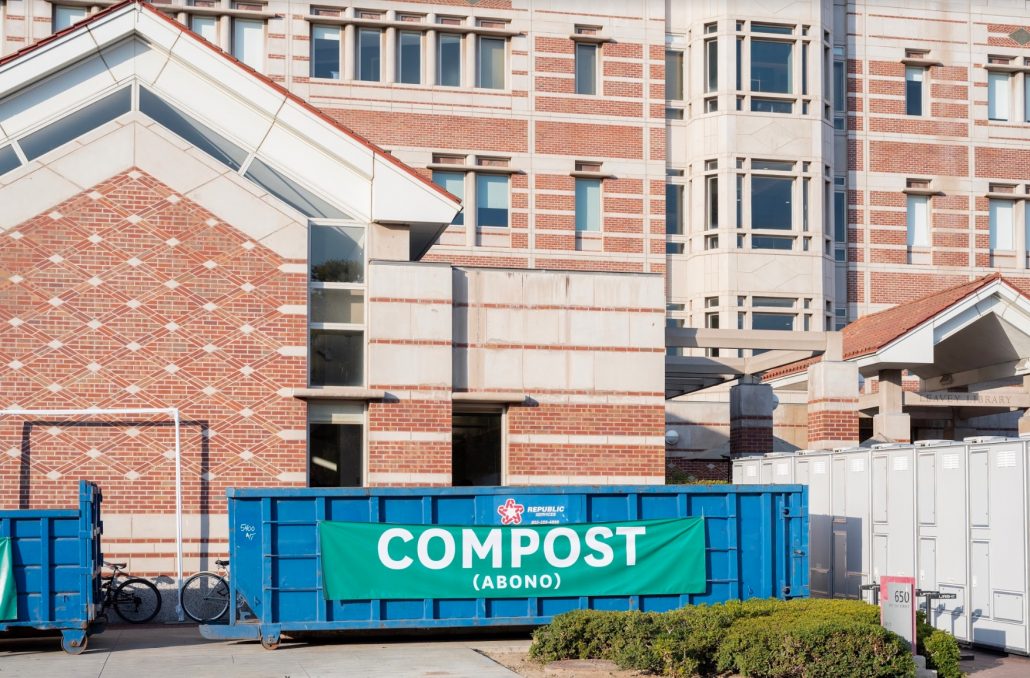USC aims for zero waste inauguration

(Andrea Diaz | Daily Trojan)
President Carol Folt’s inauguration is one for the books. While the former University of North Carolina at Chapel Hill chancellor is the first female president to be inaugurated in USC’s history, the ceremony is unique for another reason: its plan to achieve zero waste.
“As an ecologist, I have always been concerned with making sure we all do everything we can to sustain our planet,” Folt wrote in a statement to the Daily Trojan. “When I arrived at USC, I was so heartened by the sincere desire of our students, faculty, staff and [the] entire campus community, to do more to curb our environmental impact.”
Adam Rosen, vice president of the USC Office of Cultural Relations and University Events, said his department oversaw planning for the event and that he met with Folt to discuss her plans for the day.
“When I initially met with Dr. Folt, she said, ‘The one thing that I want is for this to be the greenest inauguration that has ever happened,’” Rosen said. “We sat down as a team to brainstorm from the event side … and brought in all of our campus partners.”
According to the USC Office of Sustainability, the ceremony makes “meaningful strides” in implementing and expanding the University’s sustainability efforts. Ellen Dux, associate director of the Office of Sustainability, said the ceremony’s ambition was a collaborative effort from various offices on campus, including Facilities Management Services, USC Auxiliary Services and the Office of the President, among others.
“[Folt] is using this public opportunity to signal to the broader community that this is a priority, and it speaks more broadly to aggressively advancing sustainability on our campus,” Dux said.
According to the office, the inauguration aims to divert 90% of trash away from local landfills. To achieve this goal, the ceremony will utilize compostable and recyclable materials and encourage all attendees to properly divert waste into color-coded bins.
The zero-waste inauguration fact sheet found on the office’s website identifies and breaks down the material that each item used at the inauguration is made of — everything from certifiably compostable napkins to disposable wooden forks and spoons.
“With inauguration, I wanted to make sure we set the tone early, even as we plan for more concrete initiatives that I look forward to working with our community to implement soon,” Folt wrote.
Dux said that while the operation may seem like a challenge, efforts to increase sustainability on campus are a joint effort between FMS, USC Hospitality, the administration and the public.
“This is a very public moment for [Folt] and for USC, and she said ‘I want to put this first foot forward and signal to everyone who is watching that USC is committed … and serious about advancing sustainability,” Dux said. “But it’s not a closed loop, anyone can wander anywhere with a burrito from home or a huge jug of something in plastic.”
The factsheet outlines seven steps necessary to achieve a zero waste inauguration, including eliminating single-use plastics; reducing paper waste such as programs; using compostable serviceware; encourage caterers to minimize excess food; educate guests on waste diversion; donate leftover food to food banks; and work with waste haulers to track the destination of the ceremony’s waste.
Rosen said the biggest challenge of the initiative has been working with the city to ensure that waste from the event is diverted away from landfills.
“When we first started this process, we didn’t think we would be able to compost properly,” Rosen said. “So working within the city’s confines and what the University is required to use was probably the hardest piece — this is where we lean on our partners.”
This is not the first large-scale event at USC that will be zero waste. In April, the Los Angeles County recognized the USC Office of Sustainability for making the Los Angeles Memorial Coliseum a zero waste facility. For two years in a row, USC’s stadium also won the Pac-12 Conference Zero Waste Competition. However, Dux believes that achieving zero waste for the inauguration will be more challenging than the Coliseum.
“It’s one thing to do zero waste at the Coliseum, which is a huge venue but … the Coliseum is a closed loop — we control everything that goes in or out,” Dux said.
Helen Williams, a junior majoring in international relations and environmental studies, said she hopes the inauguration educates the community on zero waste practices.
“A lot of people, especially on campus, don’t know how to sort their waste and don’t know the proper ways to recycle, so having such a campus-wide event [where] everyone is invited and everyone is aware of the diversion of waste increases awareness about the movement and promotes sustainability,” Williams said.
Rosen hopes that the inauguration shows students who are concerned with sustainability on campus that the University is taking important steps toward change.
“It’s lovely to see something like this coming to ’SC,” Rosen said. “An area where I have seen students complain about the lack of sustainability and the lack of initiatives around that.”
Williams believes that many students are often too busy with their day-to-day tasks to realize the need to be conscious and considerate of their habits. She hopes that Folt’s prioritization of sustainability will increase these conversations on campus.
“Having someone in the highest office on campus constantly remind us that [sustainability] is important and that environmental crises are happening will impact all of us,” Williams said.

